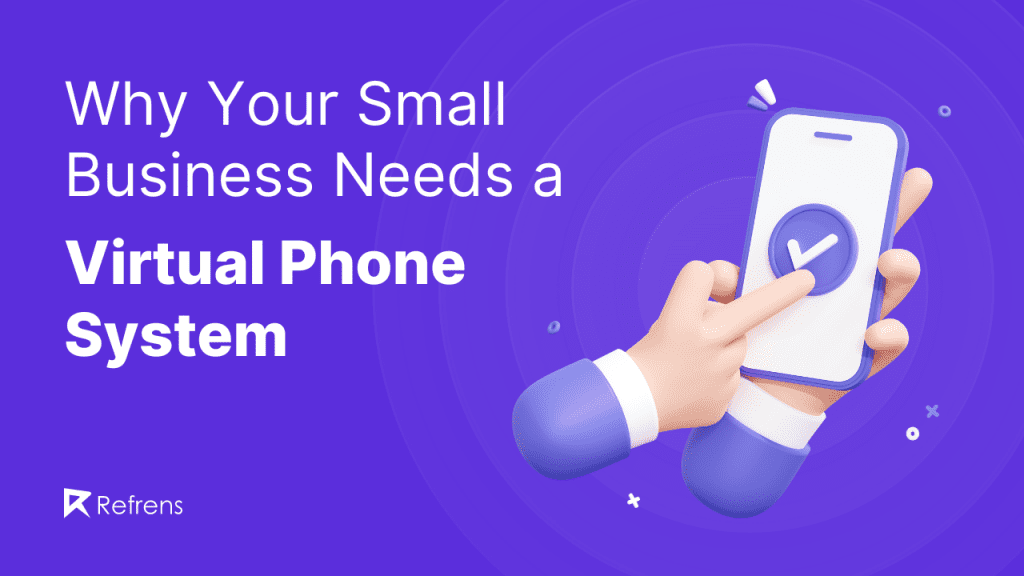In today’s fast-paced business environment, small businesses face unique challenges such as limited resources, geographic flexibility, and the demand for efficient customer service. Best virtual business phone systems, leveraging cutting-edge cloud technology, provide a tailored solution to these challenges.
They offer cost-effective and flexible communication capabilities that far surpass traditional landlines, incorporating advanced features like call routing and customer interaction tools to enhance efficiency and scalability.

What Is a Small Business Virtual Phone System
Unlike traditional landlines, virtual phone systems utilize the internet to provide features like call routing, voicemail-to-email transcription, and unified communications. They are prized for their adaptability to remote work and scalability, making them attractive to small businesses.
These systems rely on Voice over Internet Protocol (VoIP) technology, which converts analog voice data into digital signals for Internet transmission. This enables high-quality, location-independent real-time conversations, unlike landlines with their physical connections and limited capabilities.
Virtual phone systems also offer cost-effectiveness by eliminating the need for expensive hardware. They provide customizable plans tailored to a business’s specific requirements, are easy to set up, scalable, and compatible with various devices.

Landline vs Virtual Phone Systems for Small Businesses
To make an informed decision about communication solutions, small businesses must understand the stark differences between traditional landlines and virtual phone systems. This comparison is essential to discern why more businesses opt for virtual systems over conventional landline phones.
Cost Considerations
Virtual phone systems are more cost-effective than landlines. They eliminate the need for physical phone lines and their associated maintenance costs, which can be substantial. This factor alone makes virtual systems a more budget-friendly option for small businesses.
Flexibility and Scalability
Unlike landlines, virtual phone systems offer unparalleled flexibility. They easily adapt as a business grows, allowing for adding or removing phone numbers and extensions without needing physical infrastructure changes. This scalability particularly benefits small businesses anticipating growth and operational scale changes.
Technological Advancements
Virtual phone systems boast advanced features that landlines lack, such as call routing to any device, integration with other digital tools, and voicemail-to-email transcription. These features enhance collaboration and communication within the business, contributing to higher productivity and efficiency.

Reliability
With the increasing reliability of internet services, virtual phone systems often provide more consistent and accessible communication solutions than traditional landlines, which can be affected by physical line issues.
Advantages of Virtual Phone Systems
As small businesses navigate the challenges of a dynamic market, adopting virtual phone systems has become increasingly crucial. These systems align with the evolving technological landscape and address the specific communication needs of small enterprises. The benefits of virtual phone systems for small businesses are clear:
Enhanced Collaboration and Communication
Features like call forwarding, voicemail transcription, and the ability to use the system on multiple devices enhance internal and external communication, fostering a more collaborative environment.
Adaptability to Changing Technologies
Virtual phone systems are designed to adapt to evolving technological trends, ensuring that small businesses stay ahead in the digital age. This adaptability future-proofs businesses against rapid technological advancements.
Professional Image
Even small startups can project the image of a well-established company with features like customizable call greetings and Interactive Voice Response (IVR) menus, crucial for building a customer-focused brand.
How Does a Virtual Phone System for Small Businesses Work
A virtual phone system revolutionizes small business communications with its cloud technology and VoIP blend. Its ease of setup and operational flexibility make it a key tool for small business communications.

Operational Mechanics
With a virtual phone system, calls can be efficiently routed to available staff or, outside business hours, to voicemail transcription.
This system ensures that customer inquiries are handled promptly, enhancing overall customer satisfaction and streamlining workflow.
User Interface and Setup
Designed for simplicity, the system’s setup requires minimal hardware and is quickly implemented. Businesses can customize settings like call routing and voicemail to their specific needs.
The user-friendly interface allows easy management of communications, boosting productivity and ensuring professional customer interactions.
Business Needs Alignment
Tailored for small businesses, the system offers features like automated greetings and voicemail transcription, projecting a professional image. Its cost-effectiveness, eliminating the need for physical lines, and scalability to match business growth make it an indispensable asset in the modern business landscape.
Steps for Setting Up a Virtual Phone System for Small Businesses

Setting up a virtual phone system for your small business involves several key steps to enhance communication and professionalism. Here’s a comprehensive guide to help you navigate the process:
- Assess Business Needs and Internet Connectivity: Understand your business’s communication requirements. Consider factors such as the number of employees, call volume, and specific features needed. Also, ensure you have a reliable and robust internet connection, as the business phone system relies heavily on internet connectivity for clear voice quality and uninterrupted service.
- Choose Between Softphones or Hardware: Decide whether to use softphones (software-based phone applications on computers, smartphones, or tablets) or hardware (physical desk phones). Softphones offer cost-effectiveness and flexibility, while hardware solutions provide a traditional phone experience.
- Setting Up a Business Phone Number: Decide on to get a business phone number or port an existing one. This step is crucial for maintaining a professional image and separating personal and business communications.
- Testing Call Quality and Features: Conduct test calls to ensure satisfactory call quality. Familiarize yourself with the system’s features, such as call forwarding, voicemail setup, and call routing.
- Onboarding and Training Staff: Properly onboard and train your team to use the new system. Provide resources, support, and training materials for a seamless transition. Regular webinars and training sessions can help your team maximize the new system’s utility.
Selecting a Provider
Selecting a virtual phone system provider is a pivotal decision for small businesses, as the right choice can significantly enhance communication efficiency and functionality. When evaluating providers, it’s crucial to consider factors like feature sets, scalability, user interface, pricing, and customer support. Here’s an expanded look at some leading virtual phone system providers:
- Ooma: Offers a reliable and secure VoIP service with advanced features like multi-ring functionality and call parking, making it ideal for businesses needing versatile and robust communication tools.
- RingCentral: Renowned for its professional-grade services, RingCentral includes features like call analytics and CRM integration. It’s user-friendly and adaptable for remote teams, making it suitable for businesses aiming to streamline their communications.
- Nextiva: Provides a cloud-based platform with AI-powered analytics and CRM tools, ideal for businesses seeking integrated communication solutions. It supports unified communications, including voice, video conferencing, and instant messaging, making it a comprehensive choice for diverse business needs.
- GetVoIP: GetVoIP serves as a trusted resource for discovering top-rated VoIP solutions tailored to your business needs. With expert reviews, comparisons, and detailed insights, it simplifies the decision-making process, helping businesses choose the right communication tools to enhance efficiency and collaboration.
- 8×8: Known for its affordability and rich feature set, 8×8 caters to small businesses with budget-friendly plans. It offers unlimited calling, video conferencing, and team messaging, making it a cost-effective option for businesses on a tight budget.
- Dialpad: Dialpad stands out for its device flexibility and scalable pricing plans. The Pro plan is particularly suitable for small businesses, balancing affordability with a comprehensive feature set.
- Vonage: Specializing in API integrations, Vonage provides scalable cloud contact center solutions. It offers a range of features, although there have been reports of issues with customer support and SMS services.
- Phone.com: Favored for startups due to its exceptional customer service and straightforward interface. The platform includes features like IVR systems and call recording, presented at competitive prices.
- Teams Phone by Microsoft: An excellent option for businesses already integrated with Microsoft services. It provides a seamless audio and video call platform and essential telephony features.
- Aircall: Aircall is geared towards virtual customer service centers, offering local and international numbers, a virtual phone number, a softphone for desktop and mobile, and tools for team collaboration.
- Net2Phone: Delivers a blend of calls, messaging, and video conference tools. It’s a comprehensive solution for businesses requiring various communication functionalities.
- Cloudtalk: Tailored for businesses focusing on customer calls, both local and international. It features smart call routing, VIP queues, and integration with WhatsApp for instant messaging, catering to customer service-oriented businesses.
- KrispCall: KrispCall is a virtual cloud phone system designed for modern businesses. It offers reliable telephony services, including the ability to send and receive SMS, as well as VoIP calls to international and local numbers.
- Heyo Phone: Heyo Phone offers digital lines for micro to small businesses, integrating directly with smartphones to avoid extra SIMs. Key features include unlimited calls, staff addition under one business phone number, and call analytics, making it an affordable, all-in-one communication solution for enhancing business efficiency.
When choosing a virtual phone system provider, businesses should carefully evaluate their team size, customer interaction styles, and future expansion plans to find a solution that best fits their communication needs. Free trials or demos offered by these providers are a smart way to gain practical experience with their systems before committing to one.
Conclusion
Embracing a virtual phone system is a strategic move for small businesses aiming to modernize their communication processes. These systems, rooted in cloud computing technology, offer advanced features like call routing, voicemail, and automated attendants and ensure professional handling of every call.
Their cost-effectiveness, eliminating the need for physical phone lines, translates into substantial savings. Moreover, the flexibility to stay connected from anywhere enhances customer service and ensures no important calls are missed.
Implementing a virtual phone system is more than a mere upgrade; it’s a future-proof investment for small businesses. It aligns with evolving technology trends and scales according to business growth, offering long-term value.
By adopting this technology, small businesses can significantly improve their professional image, streamline communication processes, and enjoy a potential return on investment.
Therefore, small businesses must seize this opportunity to enhance communication capabilities and set a strong foundation for continuous growth and success.
Read more: 10 Best Invoicing Software For Textile Shop
Recommended Reads: 15 Best Invoicing Software In 2024



















